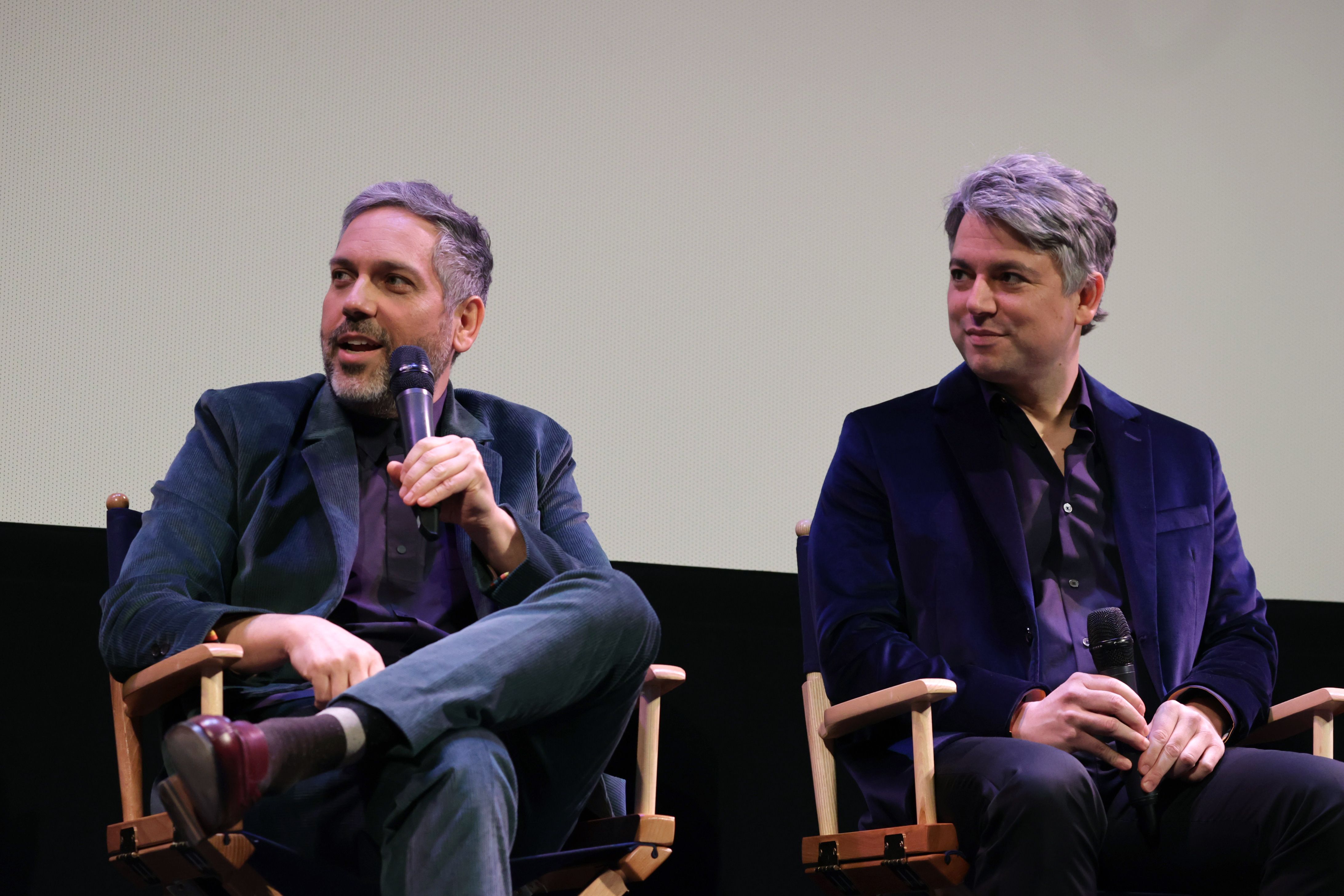The creators of WeCrashed on making a drama about the scandalous rise and fall of a $47bn tech start-up
As Jared Leto and Anne Hathaway bring their portrayal of WeWork founder Adam Neumann and wife Rebekah Paltrow to the screen, Kevin E G Perry talks to screenwriters Lee Eisenberg and Drew Crevello about why the real villain of their drama is venture capitalism


Your support helps us to tell the story
From reproductive rights to climate change to Big Tech, The Independent is on the ground when the story is developing. Whether it's investigating the financials of Elon Musk's pro-Trump PAC or producing our latest documentary, 'The A Word', which shines a light on the American women fighting for reproductive rights, we know how important it is to parse out the facts from the messaging.
At such a critical moment in US history, we need reporters on the ground. Your donation allows us to keep sending journalists to speak to both sides of the story.
The Independent is trusted by Americans across the entire political spectrum. And unlike many other quality news outlets, we choose not to lock Americans out of our reporting and analysis with paywalls. We believe quality journalism should be available to everyone, paid for by those who can afford it.
Your support makes all the difference.In 2010, self-described “serial entrepreneur” Adam Neumann and architect Miguel McKelvey founded the shared-workspace company WeWork. It seemed they’d found a profitable way to take advantage of two significant trends: the surplus of relatively low-cost office space left vacant following the 2008 financial crisis, and a rise in the number of workers turning to freelancing or creating their own start-ups. The company grew quickly from its first location in New York’s SoHo district, and within a few short years it was being described using the much sought-after name given by investors to any start-up valued at over $1bn. WeWork was a unicorn.
That was only the beginning. As WeWork grew so did the scale and grandiosity of Neumann’s ambitions. They rapidly opened hundreds of new locations across North America, Europe and Israel, as well as expanding into luxury gyms (Rise by We), private schools (WeGrow) and co-living accommodation (WeLive). Neumann pitched his company to excitable investors as more than just a real estate company. WeWork, he claimed, was actually more like a tech start-up, and he was offering the chance to invest in a “physical social network”. By January 2019 the company had achieved a valuation of $47bn, making it the third-highest valued privately-owned company in the world, placed just behind Uber and Airbnb.
In September 2019, that valuation came tumbling down almost overnight. WeWork was preparing for its initial public offering (IPO), when it would begin offering shares on the stock market and transition from private to public ownership. It also meant that for the first time the company would have to make its internal finances public. They weren’t good. WeWork was losing $219,000 every hour it operated, putting it in a position where it was too broke to even lay off staff as it couldn’t afford to pay their severance packages. At least one job loss was guaranteed by these revelations: on 24 September 2019, Adam Neumann was forced to resign as CEO of WeWork.
The saga of WeWork’s dramatic rise and fall has already been told in documentary form, first in a Wondery podcast and then in the 2021 film WeWork: Or The Making and Breaking of a $47 Billion Unicorn. Now the tale is getting the glossy drama treatment as WeCrashed on Apple+, with Oscar winners Jared Leto and Anne Hathaway playing Adam Neumann and his wife Rebekah Paltrow – first cousin of Gwyneth. The show, which uses the WeCrashed podcast as its source material, was co-created by Good Boys writer and The Office alum Lee Eisenberg and Drew Crevello, a writer and former Fox executive who helped develop films like Deadpool and X-Men: First Class.
While the writers bring a wry comic sensibility to the series, they say that what really attracted them to the tale of WeWork was the love story at its heart. “We both love rise and fall stories and find them delicious and enticing in the same way that a lot of people do,” says Eisenberg, speaking over video call from Los Angeles. “What separated this story to us was Adam and Rebekah. This love story at the centre was something that we had never seen before. To tell the story of WeWork, you have to tell the story of Adam and Rebekah. One is completely linked to the other. There is no WeWork without Adam, and there’s no WeWork without Rebekah.”
One of the things which set WeWork apart from other shared-workspace companies was a freewheeling company culture created by the Neumanns, fuelled by plentiful tequila and cannabis and justified on the basis that they were creating something more powerful than a real estate company: a true community. This manifested itself in debauched corporate summer camps that Eisenberg notes bore a striking resemblance to those run with much more nefarious intent by Keith Raniere’s self-help group-turned-sex-trafficking cult NXIVM. “When you see them on stage, there was definitely a cult-like element to WeWork,” he says. “It looked like NXIVM. These people were so seduced by Adam’s speechifying. The prospect that you could make a lot of money and change the world is very tantalising.”
But what separates WeWork from stories such as NXIVM, or even Elizabeth Holmes’s failed medical start-up Theranos, is that their core product was a perfectly good one. “With Theranos, it’s bullsh**, right?” says Eisenberg. “She created something, it doesn’t work, she lied, she defrauded people, and people died. That’s criminal. WeWork worked! I took a meeting at a WeWork in New York and it was f***ing awesome. It was beautiful. It was well designed. Adam was a great salesperson with a great product. So what did he do wrong? Well, I think he grew too fast and he flew too close to the sun.” If Neumann flew too close to the sun, then it was WeWork’s deep-pocketed private investors who slapped on his feather-and-wax wings. By consistently funnelling money into the company based on little more than Neumann’s grandstanding and promises of untold returns, they were creating the conditions for what the New York Times called “an implosion unlike any other in the history of start-ups”.

It’s for that reason that Eisenberg and Crevello say they wanted to avoid a simplistic narrative that would paint the Neumanns as the villains of the piece. “Adam and Rebekah Neumann do not exist in a vacuum,” points out Crevello. “As fascinated as we were with them, we tried to really show that there’s a larger story to be told here about the investors and about the state of venture capital, certainly in America. It’s to do with Silicon Valley culture, this relentless search for unicorns and the mythologizing of founders. The investors have FOMO, like everyone else, they have a fear of missing out. So all of these forces, the ‘fake it till you make it’ culture, come together to create these bubbles and to create stories like WeWork.”

A perfect example of this came in 2017, when Masayoshi Son, the billionaire CEO of the Japanese holding company SoftBank, agreed to bankroll WeWork to the tune of $4.4bn. Son had previously seen massive returns after becoming an early investor in e-commerce site Alibaba, the “Amazon of China”, but Eisenberg describes the moment he decided to invest in WeWork as “the worst thing that could ever happen” to Neumann, because it drove the company’s valuation up to a level it could never justify or follow-through on. “These investors want their returns to be so outsized,” explains Eisenberg. “If you invest $100 in a company and you get back $200, everyone says: ‘Well, that was a failure’. You invest $100 so you get back $100,000. So when Masa invests $4.4bn he’s thinking: ‘Oh, I want this to become the next Alibaba.’ That is incredibly dangerous, and with someone like Adam who always feels like he just wants the next thing, he wants more and more and more, you’re throwing fuel on the fire by giving him that money.”
WeCrashed, then, is not merely the tale of a well-connected, eccentric and avaricious couple who turned a small fortune into an obscene one, often at the expense of their own employees. It’s also an indictment of a venture capital model that continues to prioritise vast returns for investors over building sustainable companies. “For people that are looking for a takedown of Adam and Rebekah, to do that would actually let a lot of other people off the hook,” says Crevello. “In terms of where we are as a culture, in terms of venture capitalism, I think it’s more provocative and it raises more questions to not just say: ‘Let’s take down these two’, but instead let’s look at how these things come about.” The story of WeWork ends up serving as a timely reminder of a fact any schoolchild could tell you: unicorns don’t exist.
‘WeCrashed’ is on Apple+ from 18 March



Join our commenting forum
Join thought-provoking conversations, follow other Independent readers and see their replies
Comments